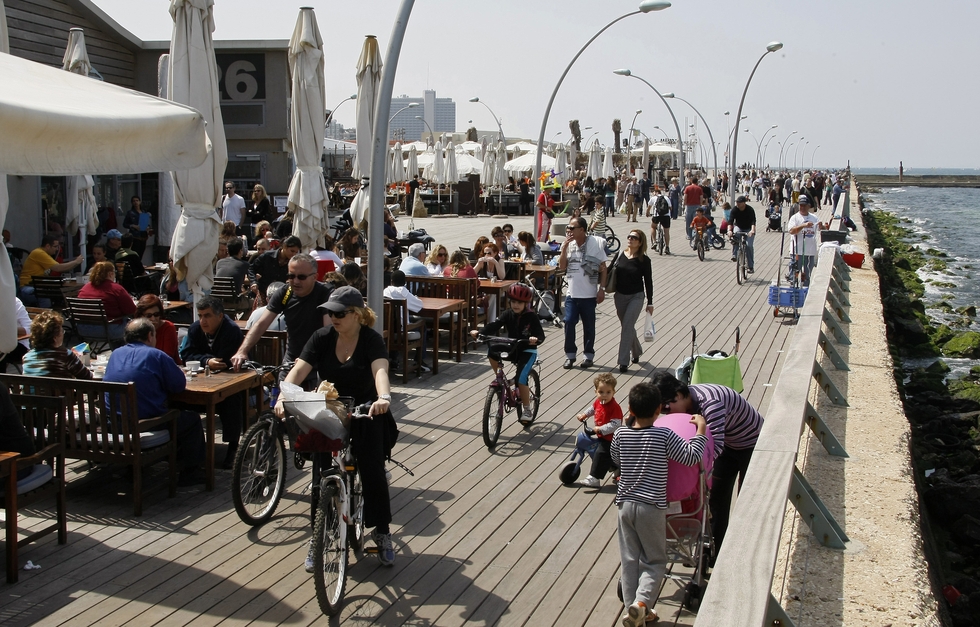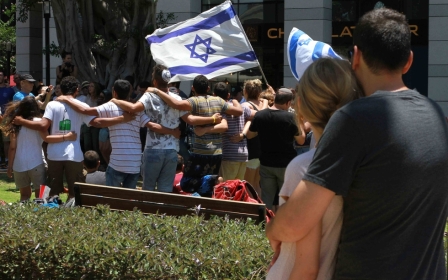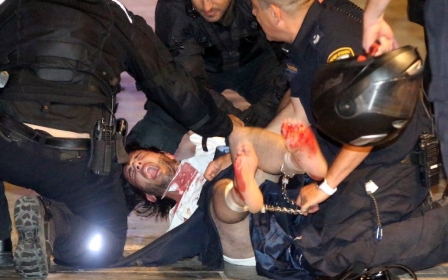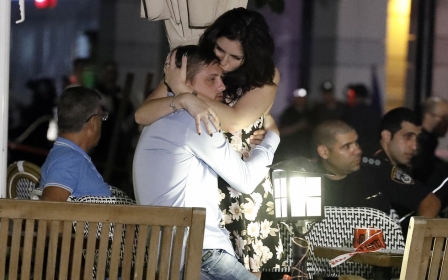Tel Aviv's European illusion

In the hours that followed Wednesday’s attack in Tel Aviv, in which two Palestinian gunmen opened fire and killed four Israelis in a cafe, reports of celebrations in Palestinian towns from Gaza to Bethlehem, and even East Jerusalem, filled Israeli media. It is not clear how many participated in these spontaneous showings of support for the killings, but it was enough to draw much-expected condemnations and appalled reactions from many Israeli politicians and commentators.
What was less expected were the cheerful remarks by many right-wing Israelis on their personal social media accounts.
"Most important is that it [the attack] happened in Tel Aviv. What a joy," wrote one right-wing activist. Others wrote similar posts. The author of the "joy post" was also not ashamed to air a video clip in which she defended her views. Tel Aviv had it coming, she said.
Social media can be misleading, so it is hard to estimate how many Israelis share this vengeful feeling towards Tel Aviv, but it is surely another indication of how the State of Tel Aviv, as it is often called, is viewed by many Israelis - as a city that has disconnected itself from mainstream Israeli society, from Jewish values and even from the Israeli-Palestinian conflict, leaving other Israelis to suffer.
The truth is that Tel Aviv is far from immune to the conflict. From the 1967 war onwards, it has been a target of attacks and bombings, including suicide bombings during the Second Intifada. Yet politically speaking, Tel Aviv does differ dramatically from the rest of Israel. In the last general election, the three left-leaning parties - Labor, Meretz and the Joint List - gained an absolute majority of more than 50 percent in the city. Other centrist parties like Yair Lapid's Yesh Atid took 18 percent.
In Haifa, even with its considerable Palestinian population, the three left-leaning parties had only 38 percent of the votes. In Jerusalem, Israel's largest city and self-declared capital, these same parties had 15 percent. Centrist parties received 11 percent. Never has the difference between Tel Aviv and the rest of Israel been so marked.
Voting is just one aspect of the story. Last weekend, more than 150,000 Israelis participated in the annual gay pride parade in Tel Aviv, which has become a sort of symbol of the city’s openness and tolerance, especially if compared to a pride parade last year in Jerusalem, in which one of the participants was stabbed to death by an ultra-orthodox Jewish extremist.
Israel's right-wing government may look at "leftist" Tel Aviv with suspicion, but it has learned to use - or abuse - its liberal image. It sponsored a trip for more than 50 journalists to cover Tel Aviv’s pride parade, trying to foster Israel's image as "the only democracy in the Middle East". No wonder some gay activists described the whole parade as an attempt to "pink-wash" Israel's occupation of the West Bank.
This is not just a game of images. When a dozen undercover policemen beat up a Palestinian citizen of Israel near a supermarket in Tel Aviv where he worked, just because he refused to show his identity card, the supermarket's employees - mainly Jews - did not hesitate to confront the officers in an act of solidarity.
Maybe it was not by chance that the two Palestinian gunmen involved in Wednesday's attack were arrested rather than executed, as has been the case after some attacks in Jerusalem and elsewhere in the past several months.
Tel Aviv's mayor, Ron Huldai, was not afraid to relate the attack to the situation in the West Bank.
"You cannot hold people in a situation in which you occupy them and expect that they will reach a conclusion that everything is all right," he told an Israeli radio station, drawing harsh criticism from right-wing politicians.
This estrangement between Tel Aviv and the rest of Israel has deep roots. Contrary to Jerusalem, Tel Aviv is a new city - it has no holy sites. It not based on distant Jewish history. It is the most prominent manifestation of secular Zionism.
In the ongoing struggle for Israel's soul, Tel Aviv has come to represent "Israeliness" versus "Jewishness". Some scholars define it as a struggle between universalism and particularism, between Israeli democracy and Jewish ethnocracy. The Israeli reality may be more complicated than these simplistic terms, but however it is defined, it is clear that Tel Aviv is losing the right.
Maybe in defiance to the processes outside it, Tel Aviv is knowingly increasing its detachment from the rest of Israel. Many in Tel Aviv see their city as a part of the West, part of Europe, while the rest of Israel belongs, according to them, to Middle Eastern zealotry, be it Jewish or Muslim.
Symbolically enough, the very place where the bloody attack on Wednesday took place represents this trend. The shopping mall, Sarona Market, was built on remnants of an agricultural colony set up by German Templers late in the 19th century. As most of its residents were sympathizers of the Nazi regime, they were expelled by the British during the Second World War. After the 1948 war, the old German-looking houses were used as government offices for the new Israeli state.
A decade ago, Tel Aviv’s municipality decided to invest millions of dollars in preserving and renovating these old buildings. It even went to the effort of moving them several dozens of metres on special rails so they would not be damaged.
It was a peculiar decision. Tel Aviv systematically neglects its Palestinian past, and these buildings have no special architectural value. Their Nazi-linked history did not present any happy memories. Their only advantage, maybe, was that they represented a European legacy, far removed from the muddled Middle East. Exactly what Tel Aviv wanted and wants to adopt.
Yet Tel Aviv is not part of Europe. It is an integral part of the bloody Israeli-Palestinian conflict. The two Palestinian gunmen certainly did not know the history of this shopping mall, but they preferred to attack it rather than the ministry of defense and headquarters of the Israeli army, situated on the other side of the street, less than two hundreds metres from where the shootings took place.
This European-like mall, with its busy coffee shops, seems as far away as possible from the reality of the West Bank, some 70km away. Probably this is why it was chosen.
It is doubtful that this attack will shake Tel Aviv from its European illusion. A day after the shooting, the city was calm and its coffee shops were full as usual. If a referendum were put in front of Tel Avivians, they would vote overwhelmingly in favour of Israeli military withdrawal from the West Bank.
But Tel Aviv feels so cut off from the rest of Israel that it has even given up its effort to change the course of Israeli politics. So it prefers to go back to normal, to continue believing that it is a European city that happens to find itself in the Middle East.
- Meron Rapoport is an Israeli journalist and writer, winner of the Napoli International Prize for Journalism for a inquiry about the stealing of olive trees from their Palestinian owners. He is ex-head of the News Department of Haaertz, and now an independent journalist.
The views expressed in this article belong to the author and do not necessarily reflect the editorial policy of Middle East Eye.
New MEE newsletter: Jerusalem Dispatch
Sign up to get the latest insights and analysis on Israel-Palestine, alongside Turkey Unpacked and other MEE newsletters
Middle East Eye delivers independent and unrivalled coverage and analysis of the Middle East, North Africa and beyond. To learn more about republishing this content and the associated fees, please fill out this form. More about MEE can be found here.





